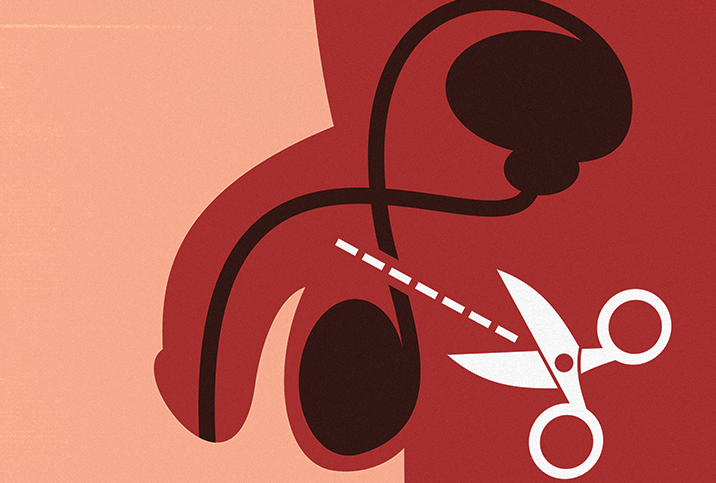Using a Vasectomy as Birth Control Counts, Too

Editor's note: Some of the sources for this article requested their full names and locations not be used.
When abortion opponents are elected or appointed to office, what happens next is predictable: Birth control becomes a hot commodity. For instance, research published in JAMA Internal Medicine found that demand for birth control in the United States shot up 22 percent shortly after Donald Trump's presidential election in 2016.
In the wake of the United States Supreme Court effectively overturning Roe v. Wade, the same trends have appeared, but even during peak anxiety about birth control access, there's one form of it that usually doesn't see the same popularity surge—one that's cheaper, has a far lower failure rate and takes a lesser toll on the body than hormonal contraceptives.
Why aren't vasectomies deployed more often in the endless war for reproductive rights?
Swiping while snipped
This question has been on my mind ever since I met Silvio on a dating app recently. He "liked" my bikini shot, and I liked his politics. We sailed past the small talk and switched over to text, trading details from our daily lives.
One day, as he was leaving a baby shower, he was inspired to share that he'd never be needing one because he'd just gotten a vasectomy.
I couldn't help but be surprised. Cleveland Clinic estimates that only 5 percent of married men have had a vasectomy, while 500,000 men overall undergo the procedure every year in the U.S. A 2018 data analysis pegged the mean age of men who underwent vasectomies at roughly 37. As a single guy in his late 20s, Silvio was an atypical vasectomy seeker.
His timing was especially uncanny, however. He had the procedure about a week before the Supreme Court's draft opinion was leaked in early May 2022. The possibility of reduced access to abortion hadn't necessarily motivated Silvio's decision, but it was already being reflected in his sex life.
"I've been seeing two people casually, and when I mentioned my vasectomy, I got a great reaction from both of them," Silvio said.
Single men seem to be catching on. These days, as I swipe through Bumble bios, I'm seeing them starting to list their vasectomies outright, alongside other attributes like height and hobbies. There's even a distracted girlfriend meme about this, joking that women in states that have lost abortion rights will now prefer men who have had a vasectomy.
Silvio's vasectomy may have surprised me, but definitely in a pleasant way. Right now, I don't use hormonal birth control, which makes me anxious about dating people who can get me pregnant. Silvio's decision, and his openness about it, makes me hopeful our culture is evolving toward seeing pregnancy prevention as everyone's responsibility, not just a duty for half of us.
Is this wishful thinking or is something truly shifting?

60 years of stasis
The politics of birth control have been stuck at a gendered status quo for seemingly all of the last 60 years. Ever since the release of the pill, birth control has been portrayed by both supporters and opponents as a "female issue," with liberals championing women's bodily autonomy and conservatives panicking at the thought of promiscuous women.
This framing bolsters the widespread belief that people who can get pregnant should bear the full responsibility of preventing it, too.
This may be slowly shifting.
Justin Houman, M.D., a reproductive urologist and men's health specialist at Tower Urology in Los Angeles and the medical director for Bastion Health, an app-based telehealth platform for men, performs about 150 to 200 vasectomies each year and says that many of his patients cite their partner's dissatisfaction with hormonal birth control options as a reason for pursuing the vasectomy.
Oftentimes, these men are already fathers, which can also heighten their sense of responsibility.
"They feel like their partner sacrificed during the child-birthing process, so some men feel that this is their sacrifice in the relationship, and the least they can do," Houman said.
A perspective like this could help explain why vasectomy rates have plummeted in recent decades, even as abortion restrictions have proliferated. This statistic comes from a Stanford University study that found vasectomy rates for men ages 18 to 45 declined consistently between 2002 and 2017.
The study noted that vasectomy use is significantly associated with men who are white and have a higher household income and higher education level. This implies that it's likely that far more than 5 percent of married men would get a vasectomy if they could.
How many vasectomy seekers would skip the snip entirely if they had a truly reversible alternative? While many urologists perform vasectomy reversals, the results can vary wildly depending on a host of personal factors. A vasectomy is still considered a permanent procedure, and condoms, which are single-use and prone to failure, aren't an ideal fallback.
This is why more research and development of long-acting yet reversible methods of male birth control are so badly needed, even in the face of potential systemic obstacles such as funding and social norms.
There are hopeful signs that more contraceptive methods for people with testes are coming, such as the human trials underway for a twice-a-day pill and a topical gel. These products would be game changers, potentially shifting the whole culture of sex and dating; but we can't just wait for that promising future—we must act.
An expanding movement for using vasectomy as birth control
As the sun at least partially set on Roe v. Wade, the U.S. may be at the beginning of its greatest civil rights rollback in decades. The battle in the reproduction rights arena is getting bleak enough that even cisgender men are stepping into the ring.
In May 2022, the hashtag #MenAtTheMarch took off online, weaving a tapestry of snapshots from pro-choice protests across the country that seemed to include more men than usual.
Other guys were offering to split the bill for the pill or pass satirical bills in government, such as Pennsylvania state Representative Chris Rabb, D-Philadelphia, who announced his intention late in 2021 to require certain men to have vasectomies.
The trend clearly indicates that the ranks of men interested in birth control equity are growing. If that energy can be sustained and channeled into direct action, the fight for reproductive rights can only grow stronger. If vasectomies become destigmatized along the way, even better.


















